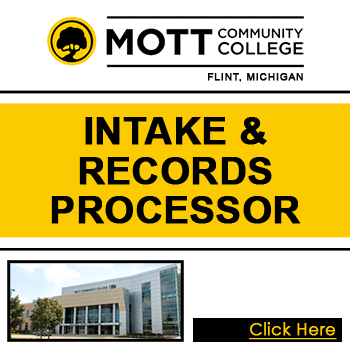
Collection Development Librarian
Job Description
Collection Development Librarian
Job Number : 202400054
Salary : Depends on Qualifications
Location : Greenville, NC
Job Type : Full Time
Division : Academic Affairs/SDS Division
Department : Curriculum and Instruction
Opening Date : 09/13/2024
Closing Date : 10/6/2024 11:59 PM Eastern
General Statement of Job
Under limited supervision, the Collection Development Librarian is responsible for the development and management of the library’s collection, including books, journals, digital resources, and other materials. This position involves assessing user needs, selection material, evaluating collection effectiveness, and cataloging materials. The position provides reference services on a regular basis and performs related work as directed. Reports to the Library Director.
Essential Job Functions
The list of essential functions, as outlined herein, is intended to be representative of the tasks performed within this classification. It is not necessarily descriptive of any one position in the class. The omission of an essential function does not preclude management from assigning duties not listed herein if such functions are a logical assignment to the position.
Develop and implement collection development policies and procedures.
Evaluate and select materials for acquisition based on user needs, library goals, and budget restraints.
Monitor the collection, making recommendations for updates, withdrawals, and replacements.
Assist faculty in the selection of materials and serves as a liaison to faculty.
Conduct surveys, focus groups, or other methods to assess user needs and preferences.
Analyze usage statistics and other data to inform collection development decisions.
Create and maintain bibliographic records for new and existing library materials using established cataloging standards (e.g., MARC, RDA, LCSH).
Assign appropriate classification numbers and subject headings to library materials.
Ensure accuracy and consistency in cataloging practices.
Utilize integrated library systems (ILS) and other cataloging tools to manage bibliographic data.
Processes print material donations.
Provide reference services and research assistant to patrons.
Assist in updating web-based materials.
Supervise the part-time Library Assistant(s) and Part-time Reference Librarian(s); trains, plans, schedules, and assigns work.
Participate in professional development; stays current with industry trends, best practices, and emerging technology.
Assist in development and implementing goals, objectives, and strategic activities of the Library and the College.
Interact and communicate with diverse populations including immediate supervisor, co-workers, staff, students, faculty, and the public.
May be asked to manage the library in the absence of the Library Director.
Qualifications or Standards
QUALIFICATIONS
Master of Library Science (MLS) or Master of Library and Information Science (MLIS) from an accredited institution or the international equivalent.
Experience in an academic library setting.
Previous experience in cataloging.
Understanding of academic library materials and collection management practices.
Excellent analytical, organization, and communication skills.
Proficiency in using library management systems and other relevant software.
Minimum Training and Experience
MINIMUM QUALIFICATIONS OR STANDARDS REQUIRED
Physical Requirements: Must be physically able to operate a variety of office machines and equipment, which includes computers, printers, copiers, etc. Must be able to move or carry objects or materials. Must be able to exert up to fifty pounds of force occasionally, and/or up to twenty pounds of force frequently. Must be able to lift and/or carry weights of ten to twenty-five pounds.
Data Conception: Requires the ability to compare and/or judge the readily observable, functional, structural, or compositional characteristics (whether similar to or divergent from obvious standards) of data, people or things.
Interpersonal Communication: Requires the ability of speaking and/or signaling people to convey or exchange information. Includes giving assignments and/or directions to co-workers or assistants.
Language Ability: Requires the ability to read and utilize a wide variety of reference, descriptive, and/or advisory data and information including book reviews, technical journals, abstracts, and various reference and general library materials. Requires the ability to prepare letters, reports, and essays with proper format, punctuation, spelling and grammar using all parts of speech.
Intelligence: Requires the ability to learn and understand complex principles and techniques; to make independent judgments in absence of supervision; to acquire knowledge of topics related to primary occupation. Requires the ability to solve practical problems and deal with a variety of situations; to interpret a variety of instructions furnished in written, oral, visual, or schedule form.
Verbal Aptitude: Requires the ability to record and deliver information, to explain procedures, to follow oral and written instructions. Requires the ability to use a wide variety of reference, descriptive and/or advisory data and information.
Numerical Aptitude: Requires the ability to perform addition, subtraction, multiplication and division; ability to calculate decimals and percentages; the ability to utilize principles of fractions; and the ability to interpret graphs; and may include ability to perform mathematical operations involving basic algebraic principles and formulas, and basic geometric principles and calculations.
Form/Spatial Aptitude: Requires the ability to inspect items for proper length, width and shape, visually with office equipment and library systems.
Motor Coordination: Requires the ability to coordinate hands and eyes rapidly and accurately in using equipment and to make movement responses accurately and swiftly.
Manual Dexterity: Requires the ability to handle a variety of items, office equipment, control knobs, switches, etc. Must be able to reach, handle, finger and/or feel. Must be able to use one hand for twisting or turning motion while coordinating other hand with different activities. Must have minimal levels of eye/hand/foot coordination.
Color Discrimination and Visual Acuity: Requires the ability to differentiate colors and shades of color; requires the visual acuity to determine depth perception, peripheral vision, inspection for small parts; preparing and analyzing written or computer data, etc.
Interpersonal Temperament: Requires the ability to deal with people beyond giving and receiving instructions. Must be adaptable to performing under stress when confronted with an emergency.
Physical Communication: Requires the ability to talk and hear: (talking - expressing or exchanging ideas by means of spoken words; hearing - perceiving nature of sounds by ear).
PERFORMANCE INDICATORS
Knowledge of Job: Has thorough knowledge of the methods, policies, and procedures of the library as they pertain to the performance of duties of the Collection Development Librarian. Is skilled in maintaining and enhancing the library’s physical and electronic holdings. Has considerable knowledge of principles and practices of providing library services and assisting the Library Director. Has considerable knowledge of the laws, ordinances, standards, and regulations pertaining to the essential duties and responsibilities of the position. Has considerable knowledge of the organization of the department, and of related departments and agencies. Has clear knowledge of any occupational hazards and adheres to safety precautions inherent in performing the essential functions of the work. Has considerable knowledge of terminology and related professional languages used within the department as they pertain to work responsibilities. Has knowledge of how to maintain cooperative and effective relationships with intra- and interdepartmental personnel, as well as any external entities with which position interacts. Can oversee the daily work activities of subordinate personnel, providing guidance and direction. Can take the initiative to complete the duties of the position without the need of direct supervision. Can plan, organize, and prioritize daily assignments and work activities. Can learn and utilize new skills and information to improve job performance and efficiency. Has knowledge of proper English usage, punctuation, spelling, and grammar. Has knowledge of modern office practices and technology; has skill in the use of computers for word and data processing. Has the mathematical ability to handle required calculations. Can assemble and analyze information and make written reports and records in a concise, clear and effective manner.
Quality of Work: Maintains high standards of accuracy in performing duties and responsibilities. Exercises immediate remedial action to correct any quality deficiencies that occur in areas of responsibility. Maintains quality communication and interaction with intra- and interdepartmental personnel, and any external entities with which position interacts.
Quantity of Work: Performs described Essential Functions and related assignments efficiently and effectively in a manner to produce a quantity of work which consistently meets established standards and expectations.
Dependability: Assumes responsibility for completion of assigned functions. Completes assigned work within established deadlines in accordance with directives, policies, standards, and prescribed procedures. Maintains accountability for assigned responsibilities in the technical, human and conceptual areas.
Attendance: Attends and remains at work regularly and adheres to policies and procedures regarding absenteeism and tardiness. Provides sufficient notice to upper management with respect to vacation time and leave requests.
Initiative and Enthusiasm: Exhibits an enthusiastic, self-reliant and self-starting approach to meet job responsibilities and accountabilities. Strives to anticipate work to be accomplished and initiates appropriate and acceptable action for the completion of work with a minimum of supervision and instruction.
Judgment: Exercises analytical judgment in areas of responsibility. Identifies issues or situations as they occur and specifies decision objectives. Identifies or assists in identification of alternative solutions to issues or situations. Implements decisions in accordance with prescribed and effective policies and procedures and with a minimum of errors. Seeks expert or experienced advisement where appropriate, and research issues, situations, and alternatives prior to exercising judgment.
Cooperation: Accepts supervisory and managerial instruction and direction and strives to meet the goals and objectives of same. Questions such instruction and direction when clarification of results or consequences is justified, i.e., poor communications, variance with established policies and procedures, etc. Offers suggestions and recommendations to encourage and improve cooperation both intra- and interdepartmentally.
Relationships with Others: Shares knowledge with managers, supervisors and co-workers for mutual benefit. Contributes to maintaining high morale among all employees. Develops and maintains cooperative and courteous relationships both intra- and interdepartmentally, and with external entities with whom position interacts. Tactfully and effectively handles requests, suggestions, and complaints to establish and maintain good will. Emphasizes the importance of maintaining a positive image.
Coordination of Work: Plans and organizes daily work routine. Establishes priorities for the completion of work in accordance with sound time-management methodology. Avoids duplication of effort. Estimates expected time of completion for work elements and establishes a personal schedule accordingly. Attends required meetings, planning sessions and discussions on time. Implements work activity in accordance with priorities and estimated schedules.
Safety and Housekeeping: Adheres to all established safety and housekeeping standards, to include regulatory entities. Ensures such standards are not violated.
Planning: Plans, coordinates and utilizes information effectively in a manner to improve activities and production. Knows and understands expectations regarding such activities and works to ensure such expectations are met. Develops and formulates ways, means, and timing to achieve established goals and objectives. Effectively and efficiently organizes, arranges, and allocates manpower, financial and other designated resources to achieve such goals and objectives.
Organizing: Efficiently organizes own work and that of subordinates as well. Ensures personnel under charge understand what results are expected of them, and that each is regularly and appropriately informed of all matters either affecting or of concern to them.
Staffing: Works with upper management, where appropriate, to select and recommend employment of qualified personnel. Personally, directs the development and training of personnel under charge, ensuring their proper induction, orientation, and training.
Leading: Provides a work environment which encourages clear and open communications. Has a clear and comprehensive understanding of the principles of effective leadership, as well as the application of such principles to functions under charge. Provides adequate feedback to personnel under charge concerning their performance in terms of excellent, satisfactory, or lacking. Commends and rewards personnel under charge for outstanding performance and takes timely and appropriate disciplinary action as necessary. Exercises enthusiasm in influencing and guiding others toward achievement of established goals and objectives.
Controlling: Establishes and maintains a work environment which is orderly and controlled. Coordinates, audits, and controls manpower and financial resources efficiently and effectively. Coordinates, audits, and controls the utilization of materials and equipment efficiently and effectively. Has a clear and comprehensive understanding of established standards, methods, and procedures.
Delegating: Assigns duties and responsibilities as necessary and/or appropriate to meet goals, enhance abilities of personnel under charge, build their confidence, and assist them in personal growth. Establishes and maintains confidence in personnel under charge to meet new or additional expectations.
Decision Making: Exercises discretion and judgment in developing and implementing courses of action affecting functions under charge. Recognizes when a particular policy, procedure or strategy does not foster the desired result. Moves decisively and explicitly to develop and implement alternatives.
Creativity: Regularly seeks new and improved methodologies, policies and procedures for enhancing the effectiveness of functions under charge. Employs imagination and creativity in the application of duties and responsibilities. Is not averse to change that supports achievement of goals and objectives.
Human Relations: Strives to develop and maintain excellent rapport with personnel under charge. Listens to and considers their suggestions and complaints and responds appropriately. Establishes a work environment to promote and maintain mutual respect.
Policy Implementation: Has a clear and comprehensive understanding of policies regarding functions under charge and the function of the organization. Adheres to all policies in the discharge of duties and responsibilities and ensures the same from personnel under charge.
Policy Formulation: Maintains current knowledge of changes in operating philosophies and policies, and routinely reviews such policies to ensure any changes in philosophy or practice are appropriately incorporated into functions under charge. Recognizes and understands the relationship between operating policies and practices and morale and performance. Strives to ensure established policies enhance same.
*Please mention you saw this ad on CommunityCollegeCareers.*
Be Seen By HR Recruiters at the Best Colleges.
Create a FREE Profile Now!







